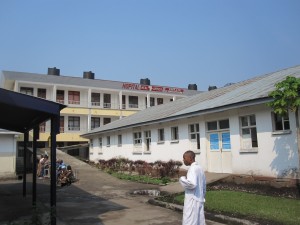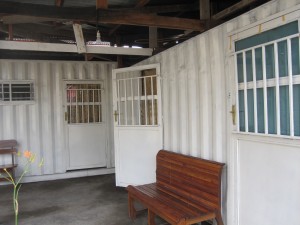The Heal Africa hospital, Goma, Nord-Kivu February 17th
 Hospitals are not joyful places, they underline knowledge of our own mortality and an African one can produce a range of emotions for a visitor. The main hospital in Goma, eastern Congo, is a private one run by an American Foundation—Heal Africa—that runs everything from clinics for victims of sexual violence to primary health posts in remote rural areas to complete hospitals. It basically is public health care in this area, or at least carries much of the burden. Their hospital in Goma, located on a dusty side road near the downtown, is a compound with a central building surrounded by a series of annexes and courtyards. The atmosphere is brisk and business-like and rather efficient. There are no crowds and no real line ups either; within minutes I am sitting in front of a young Congolese doctor in his consultation room, which is a steel shipping container in the garden, welded together with a few others. Dr Sosthene speaks passable English and went to medical school in Butembo, northern Nord-Kivu; I had no idea there was a med school there—it is a centre of extreme conflict and besides the constellation of Congolese armed groups it also hosts the whacked-out Ugandan ones, including the psychotic Lords Resistance Army that practices torture and mutilation as a matter of policy.
Hospitals are not joyful places, they underline knowledge of our own mortality and an African one can produce a range of emotions for a visitor. The main hospital in Goma, eastern Congo, is a private one run by an American Foundation—Heal Africa—that runs everything from clinics for victims of sexual violence to primary health posts in remote rural areas to complete hospitals. It basically is public health care in this area, or at least carries much of the burden. Their hospital in Goma, located on a dusty side road near the downtown, is a compound with a central building surrounded by a series of annexes and courtyards. The atmosphere is brisk and business-like and rather efficient. There are no crowds and no real line ups either; within minutes I am sitting in front of a young Congolese doctor in his consultation room, which is a steel shipping container in the garden, welded together with a few others. Dr Sosthene speaks passable English and went to medical school in Butembo, northern Nord-Kivu; I had no idea there was a med school there—it is a centre of extreme conflict and besides the constellation of Congolese armed groups it also hosts the whacked-out Ugandan ones, including the psychotic Lords Resistance Army that practices torture and mutilation as a matter of policy.
 But, the doctor tells me, the Catholic University of Butembo is there, quietly doing its work, apparently. In Congo, where the state is weak or non-existent, it is the Churches—supported by their international affiliates—that seem to provide much of the real social infrastructure and services in a more lasting and durable way than secular NGOs and aid organisations. Even better, they seem to be staffed entirely by Congolese. I haven’t seen a white face inside this hospital, or most of the Christian aid groups I’ve come across so far in Congo. However un-PC they may be, including the missionaries, they are the ones who are actually here, doing the heavy lifting, working modestly and at low cost.
But, the doctor tells me, the Catholic University of Butembo is there, quietly doing its work, apparently. In Congo, where the state is weak or non-existent, it is the Churches—supported by their international affiliates—that seem to provide much of the real social infrastructure and services in a more lasting and durable way than secular NGOs and aid organisations. Even better, they seem to be staffed entirely by Congolese. I haven’t seen a white face inside this hospital, or most of the Christian aid groups I’ve come across so far in Congo. However un-PC they may be, including the missionaries, they are the ones who are actually here, doing the heavy lifting, working modestly and at low cost.
The doctor completes his examination and directs me to get blood work and an ultrasound. After a week of abdominal pain and fading strength in boxing class, I’ve thrown in the towel, am facing up to finding out what’s wrong; it ends up being typhoid.
The radiology department is reached at the other side of an interior courtyard, next to the main residential ward, and is full of patients and their families, meandering quietly. There are people on crutches, people carrying their iv drip towers with them, old women bent over, and mothers with infants strapped to their backs. The atmosphere is calm, even rather dignified. Although rudimentary, the quality of medical care is good at this hospital and, for those that can’t pay, free. So far I’ve forked out 100 bucks to get registered, be seen by a doctor and have blood tests and an ultrasound—all of which ends up taking less than two hours. Not bad value I’d say.
The radiology office is located across from one of the operating rooms, the door to which is open, and an orderly with a green smock and white rubber boots is washing down the concrete floor with a mop and pushing the reddish water toward the floor drain. The ultrasound technician is a middle aged Congolese man who tells me that Canada is his dream country, that he’d give anything to go there:
“We are not getting ahead here in Congo. We are rich in every resource but are poor and nothing works. I can’t work in a government hospital, my family and I would starve, either that or I would have to eat from the pockets of the people who went there. It is always the same—I honestly don’t see any progress in this place”.
I would feel the same if I’d been living in a war zone for 16 years—a war without end, or a country with so little to show for all the wealth in resources and aid and investment from abroad. There are many very poor countries in Africa, each with their own narrative, their own pain. What makes any of them more bearable is the knowledge that, however poor, they are at least making progress and taking advantage of the opportunities available. Congo is not one of them.
The blood lab is across another courtyard where a new building is being built—probably with the proceeds of a 1000 Church socials and school bake sales from Wichita to Wyoming. There is a line at the blood lab and I take a seat outside on a bench in the sun, watching sick and wounded people walking past and hearing the wail of crying children, feeling the tears and finally just sobs.

Douglas:
This is good news, of a sort.
It’s very easily managed, I understand from my brief Wikipedia readings, and it must be a relief to know what it is and that you are essentially well. I’m betting that hospitals all across the world are the same in their humanity, if not their expectation and technology.
Adrian and Judi – Amazing adventure. Enjoy every mitnue (even the not so good mitnues). Great writing and amazing photos suddently life here seems so normal. Looking forward to your safe return and the slide show . Love and prayers Adrian and Judi
Thanks Mick. I’ve had it before; it is not so bad. It means the end of the boxing though, sadly…
Typhoid!….End of boxing….I’m so sad for you!
Well, hopefully not the end … it takes a week to 10 days to get over it apparently. And I really want to extend so as to be here for Kibomango’s championship fight! (which providently, has been rescheduled from June 30th to March 8th). All that stands between me and that is the North Kivu immigration department…
are you on antibiotics and rehydration? rest too, don’t forget.
sending love and light
TU EST FORT!
J’ai esprit!
Yes, on meds and drinking loads of (clean) water. Never did make it to stage 3 symptoms–delirium and picking at imaginary objects…
Hey! When you getting out here–still March 15?
Tu as esprit!
C’est ca!
Tu es fier!
C’est ca!
Tu arrive a le but!
C’est ca!
Hey Doug! I’m so sorry to hear that you are sick with typhoid, rest and fluids. Your story about the hospital is enlightening. Love you brother!! Ott oxxoo